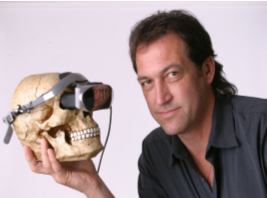Dr. Albert “Skip” Rizzo
The Wired article VR Goggles Heal Scars of War said
“All I can see in every direction is black smoke, with intermittent darts of flame. And all I hear is gunfire, mortar rounds, and the rumbling engine of the fortified tank I’m driving to Falluja.I’m inside a virtual-reality simulation of a war zone in Iraq. High-resolution goggles cover my eyes and headphones cover my ears.
As violent as they are, the computer-generated sights and sounds that fill my senses are intended to heal — I’m going through a demonstration of a system created to treat soldiers suffering from post-traumatic stress disorder, or PTSD.
Seated next to me, tapping out commands on a controller, is Dr. Albert ‘Skip’ Rizzo, a cognitive psychologist and virtual therapy developer with the Institute for Creative Technologies.”
Albert “Skip” Rizzo, Ph.D. is Research Scientist and Research Professor, Institute for Creative Technologies and Department of Psychiatry/School of Gerontology, University of Southern California.
Skip earned his Ph.D. in Clinical Psychology from the State University of New York at Binghamton. He conducts research on the design, development, and evaluation of Virtual Reality systems targeting the areas of clinical assessment, treatment, and rehabilitation. This work spans the domains of psychological, cognitive, and motor functioning in both healthy and clinical populations.
In the psychological domain, his latest project has focused on the translation of the graphic assets from the Xbox game Full Spectrum Warrior into an exposure therapy application for combat-related PTSD with Iraq War veterans. Additionally, he is conducting research on VR applications that use 360 Degree Panoramic video for exposure therapy (social phobia), role-playing applications (anger management, etc.), and recently has used this technology to capture news scenes for future multimedia journalism applications. He is also working with a team that is creating artificially intelligent virtual patients that clinicians can use to practice skills required for challenging clinical interviews and diagnostic assessments (sexual assault, resistant patients, suicide lethality, etc.). His cognitive work has addressed the use of VR applications to test and train attention, memory, visuospatial abilities, and executive function.
In the motor domain, he has developed VR Game systems to address physical rehabilitation post stroke and Traumatic Brain Injury and for prosthetic use training. He is also investigating the use of VR for pain distraction at LA Children’s Hospital and is currently designing game-based VR scenarios to address issues of concern with children having autistic spectrum disorder. His research also involves designing and evaluating 3D User Interface devices and interaction methods and he has created a graduate level Industrial and Systems Engineering course at USC entitled “Human Factors and Integrated Media Systems”.
In the area of Gerontology, Skip has served as the program director of the USC Alzheimer’s Disease Research Center and is the creator of the Memory Enhancement Seminars for Seniors (MESS) program at the USC School of Gerontology. The MESS program is an 8-week series of seminars designed to assist older persons in learning the skills for memory maintenance and enhancement.
Skip is the associate editor of the journals, CyberPsychology and Behavior and The International Journal of Virtual Reality, is Senior Editor of the MIT Press journal Presence: Teleoperators and Virtual Environments, is on a number of editorial boards for journals in the areas of cognition and computer technology (Cognitive Technology, Journal of Computer Animation and Virtual Worlds, Media Psychology), and is the creator of the Virtual Reality Mental Health Email Listserver (VRPSYCH).
He has recently guest-edited theme issues for Applied Psychophysiology and Biofeedback on “VR and Psychophysiology”, two new journal issues on “Virtual Rehabilitation” (in CyberPsychology and Behavior and in the International Journal on Disability and Human Development) and one for the MIT journal Presence: Teleoperators and Virtual Environments on “Virtual Reality and Neuropsychology”.
Skip authored Virtual reality and disability: emergence and challenge, and coauthored Development of a Data Management Tool for Investigating Multivariate Space and Free Will Experiences in Virtual Reality, Space Extension: The Perceptual Presence Perspective, Analysis of Assets for Virtual Reality Applications in Neuropsychology, Virtual Reality and Applied Psychophysiology, Is learning and memory different in a virtual environment?, A SWOT Analysis of the Field of Virtual Reality Rehabilitation and Therapy, The Challenge of Using Virtual Reality in Telerehabilitation, and Comparison of two VR platforms for rehabilitation: Video capture versus HMD.
Previously, he guest edited a theme issue in CyberPsychology and Behavior on “Aging and Information Technology”. He served as General Chair for the IEEE VR2003 conference in Los Angeles and co-chaired this conference in 2004. He was also the Conference Chair of the 4th Annual Workshop on Virtual Rehabilitation on Catalina Island, Los Angeles in September 2005. He will be chairing a military sponsored conference on “Technological Approaches for the Treatment of Wounded Warriors” in the fall of 2008. In his spare time, he plays rugby, listens to music, and rides his motorcycle.
Skip earned his B.A. in Psychology (Magna Cum Laude) from the University of Hartford in 1977, his M.S. in Experimental Psychology from the University of New Orleans in 1982, and his Ph.D. in Clinical Psychology from the State University of New York-Binghamton in 1991.
Listen to him on Shrink Rap Radio.
